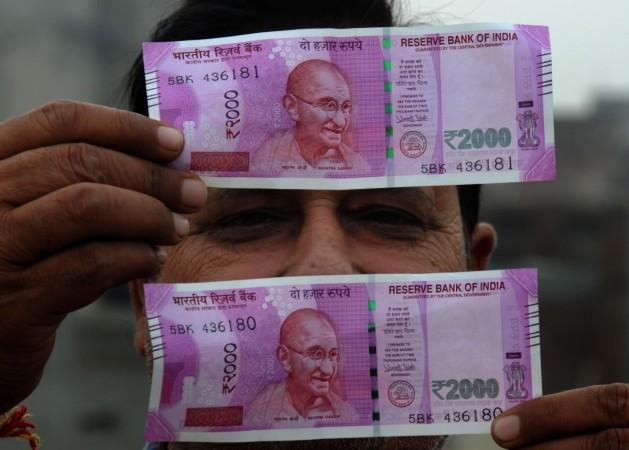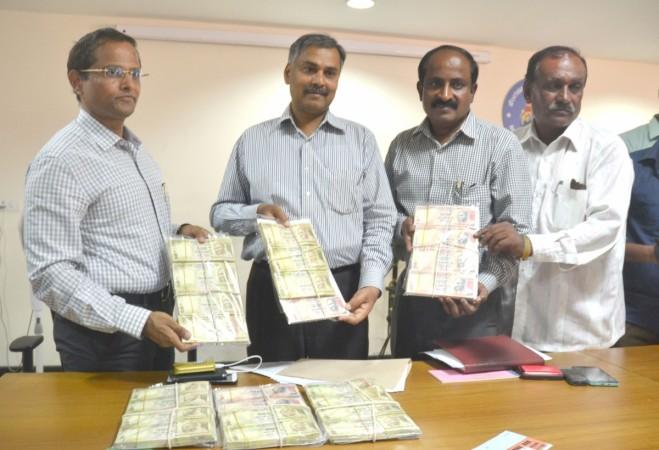
Pakistan continues to produce high-quality Fake Indian Currency Notes (FICN) in a bid to finance terror activities by militant groups Lashkar-e-Taiba (LeT) and Jaish-e-Mohammed (JeM), according to reports.
Three years after the Indian government's move to demonetise the high valuing currency to stop the circulation of black money in the economy, sources told ANI that Pakistan is activating its pre-2016 fake currency distribution networks.
Senior officials have claimed that the counterfeit currency is entering Indian soil through diplomatic channels in Nepal, Bangladesh and other countries.
Network established by the ISI agents in Kathmandu and Birganj has been pushing FICN consignments from Nepal to India. "ISI transported fake notes through the state-owned Pakistan International Airlines, or through the diplomatic bad to its Missions in Dubai, Kuala Lumpur, Hong Kong, and Doha," sources said.
Earlier reports had suggested that Pakistan's Inter-Services Intelligence (ISI) have coped sophisticated security features of the Rs 2000 Indian currency notes, like bleed lines printed on the left and right corner of the note which is meant to be identification marks for the visually impaired people.
The security officials were alerted in June about the presence of highly advanced fake notes. A large consignment of currencies amounting to Rs 7.67 crore was seized by the Nepal police at Tribhuvan Airport in Kathmandu.
A Directorate of Revenue Intelligence official had stated that the Optical Variable Ink, supplied by a multi-national company, is being smuggled into Pakistan by a state-run printing press to produce the fake notes.
"It seems that Optical Variable Ink is being smuggled through the connivance of the state-run printing press in Pakistan from a multi-national company which supplies this ink only to federal governments. It is a serious security breach," the official said.
Punjab Police in September seized Rs 10 lakh worth of fake currencies from members of the Khalistan Zindabad Force (KZF). The group had also received other items, including AK 47 Rifles, 30 bore pistols, nine hand grenades, five satellite phones, two mobile phones and two wireless sets through a Pakistan drone.
Bangladesh
Pakistan's Second Secretary at its High Commission in Dhaka, Farina Arshad, withdrew from the position after it was revealed that she had helped militant group Jamaat-ul-Mujahideen (JMB) in its operations.
In the same year, Bangladeshi authorities expelled another delegation in Pakistan Mission's consular unit, Mazhar Khan for peddling FICN and aiding terror fundings.

Reports have also suggested that members of the Pakistani Mission have developed close ties with radical elements in Dhaka university and officers of Pakistan International Airlines. These and a section of Bangladeshi nationals residing along the borders in India, such as Lalmonishat, Jessore, Thakurgaon and Benhapole have been an instrumental role in transfer for FICN into India.
Intel reports suggest that the earning from the fake currency consignments are used to fund terror outfits like Hizbt-Tahrir, Ansurullah Bangala Team and Jamaat Shibir from Bangladesh.
FATF
Pakistan has been put on a grey list by the Financial Action Task Force (FATF), an international institution that monitors international money laundering and is in high risk of being blacklisted.
The decision, which is slated to be announced by next week, will come weeks after a recent Asia/Pacific Group on Money Laundering (APG) report showed that Pakistan performed "low" in nine out of ten terror financing parametres.
"With the exception of some recent actions discussed in detail below, Pakistan has not taken sufficient measures to fully implement UNSCR 1267 obligations against all listed individuals and entities - especially those associated with Lashkar-e-Tayyiba (LeT)/Jamaat-ud-Dawa (JuD), and Falah-i-Insaniat Foundation (FIF) as well as the groups' leader Hafiz Saeed," the report read.














